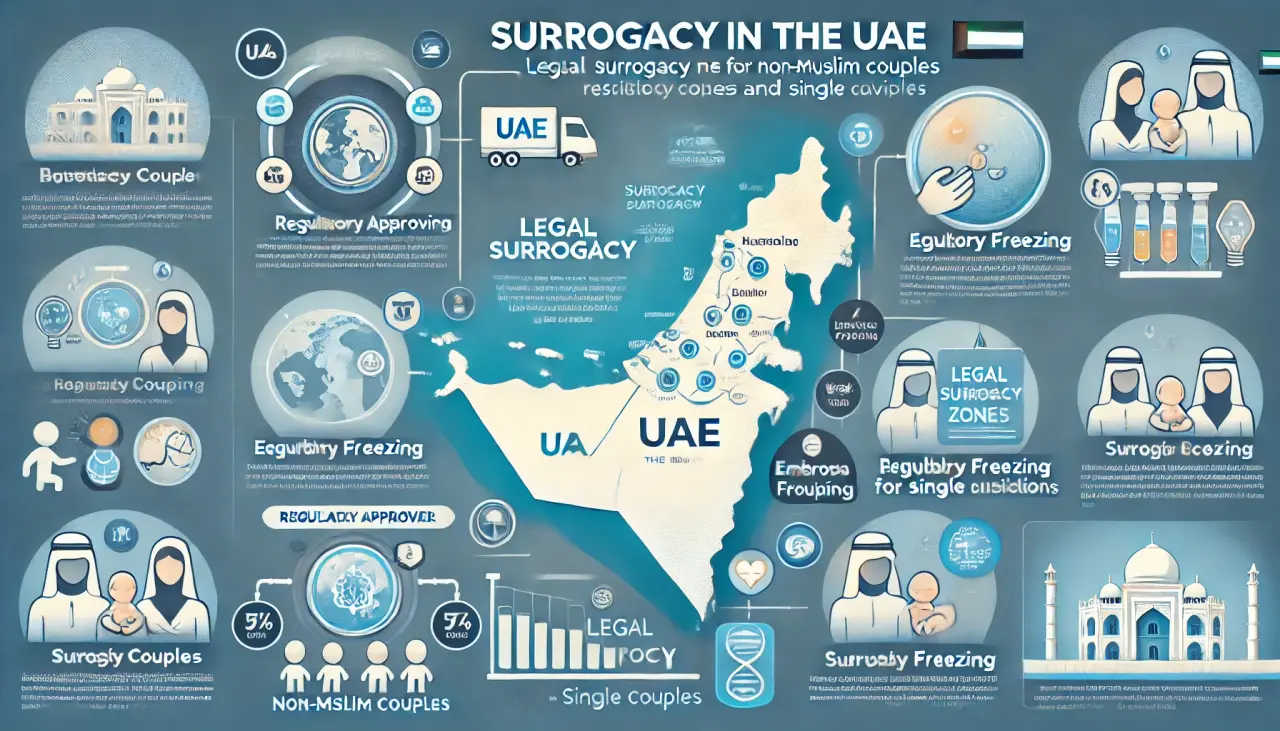
Surrogacy in the UAE: Legal Options for LGBTQ Couples and Single Individuals in 2025
In this article, we will explore the latest changes to the UAE’s fertility law that have legalized surrogacy, especially for non-Muslim groups in the country, whether married or unmarried. These changes are expected to benefit the UAE and its entire population, and we will discuss the reasons in more detail below.
1. New Surrogacy Laws in the UAE
The UAE Federal Decree No. 17/2023 (the “New Law”) amends the previous Federal Law No. 7/2019 on Medical Assisted Reproduction. According to Article 8(2) of the new law, non-Muslim couples, regardless of whether they are married, can now access any legal assisted conception and reproductive services within the UAE, including surrogacy. However, they must obtain approval from the relevant UAE regulatory authorities, and the eggs and sperm used must come from the couple seeking surrogacy.
The previous law prohibiting surrogacy has been deleted. Under the old law, it was illegal to use a husband’s sperm and wife’s eggs for in vitro fertilization and then implant the fertilized embryo into another wife’s uterus. Article 2(2) of the new law places the regulation of surrogacy under the jurisdiction of the emirates, as it mentions the “relevant regulatory authorities.” The new law also relaxes requirements for embryo freezing. As per Article 10(2), now only a written request from the couple is required for embryo freezing, without the need for special approval from the regulatory authorities (although the broader consent will cover embryo freezing).
2. How to Pursue Surrogacy in the UAE – Conditions and Requirements
According to Article 8(2) of the new law, to use frozen eggs, embryos, and surrogacy services, approval from the relevant regulatory authorities must be obtained. The law also stipulates that one or both parties must submit a child lineage recognition letter, approved by the regulatory authority in the individual’s or couple’s home country. The child will then acquire the nationality of the parents’ home country. After obtaining regulatory approval, the couple can access surrogacy services.
3. Is Surrogacy Legal for LGBTQ Couples and Single Individuals in the UAE?
Unfortunately, LGBTQ couples and single individuals cannot pursue surrogacy in the UAE under the current law. The UAE’s surrogacy law still prohibits the use of third-party genetic material such as sperm or egg donation, and LGBTQ couples do not have the legal standing to access these services.
Additionally, single individuals—those who do not have an opposite-sex partner—are also unable to pursue surrogacy legally within the UAE. Surrogacy in the UAE remains a strictly regulated service available only to certain non-Muslim couples who meet specific criteria and obtain necessary approvals.
4. Reasons for and Impact of Changes in Surrogacy Laws
The changes to the surrogacy laws align with broader shifts in the UAE’s family law, including laws passed in February 2021 under the approval of the late President Sheikh Khalifa bin Zayed Al Nahyan regarding the rights of non-Muslim expatriates in the UAE to marry and divorce.
These changes are expected to make the UAE more attractive to international talent, drawing in more expatriates while positioning the UAE as a medical tourism hub in the region. As a result, there has been a rise in IVF services in the UAE, especially as surrogacy services gain prominence for specific legal groups. However, despite the progress, LGBTQ couples in the UAE 2025 still face legal barriers in this field.
5. Safeguards for Surrogacy in the UAE
Under certain circumstances, UAE surrogacy regulatory authorities will issue written consent after receiving the appropriate applications for assisted reproductive services to ensure that the couple can legally access surrogacy services. The full set of safeguards from the old UAE assisted reproduction laws has been retained and updated to align with the new regulations. For instance, Article 14 explicitly prohibits the use of eggs and sperm in certain ways, such as egg and sperm banks. Article 22 specifies enforcement rules at both the national and emirate levels.
As of now, no specific safeguards or additional standards have been published regarding surrogate mothers. However, the new law no longer prohibits surrogacy. At this stage, the key legal step for a couple seeking surrogacy in the UAE appears to be whether their application to the relevant regulatory authorities is approved.
6. Conclusion on Surrogacy in the UAE
Compared to before 2021, the updated UAE surrogacy laws provide more extensive and flexible options for individuals and couples. However, reproduction and the use of fertility services are among the most significant decisions many people will make in their lifetime. These decisions are often long-term plans, and couples, in particular, should carefully consider the direction of their future lives. For non-Muslim expatriates, this may involve moving to another country or returning to their home country before or during certain stages of fertility treatment. It is important to foresee and consider the potential impact of such situations early in the family planning process, to ensure the necessary flexibility is considered.
This article was written by healthcare lawyer James Clarke, with a focus on the UAE’s fertility laws.